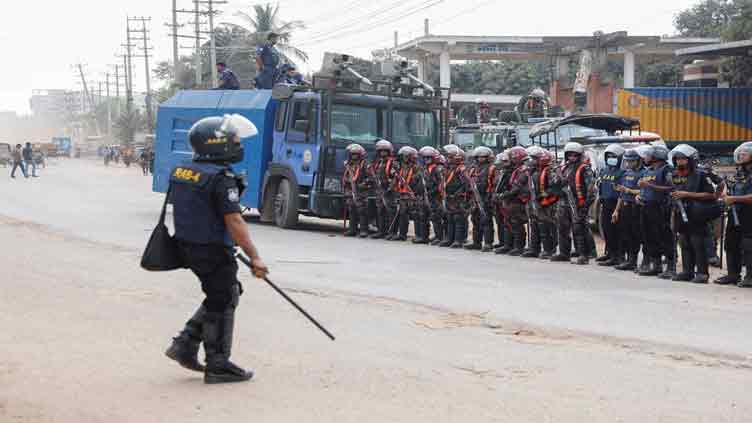One killed as Bangladesh garment workers clash with police despite pay raise

Business
Deal includes 56.25pc minimum wage hike, 5pc annual increment, welfare and ration cards
DHAKA (Reuters) – One female worker was killed and several others were injured in Bangladesh on Wednesday during clashes between police and stone-throwing garment workers who are demanding a bigger pay rise, police said.
Police said they used teargas and rubber bullets to break up protests by hundreds of workers who took to the streets in the garment hub of Gazipur, on the outskirts of the capital Dhaka.
"The workers blocked roads and vandalised several vehicles. We had to use tear gas, rubber bullets and sound grenades to disperse the unruly workers, who were throwing brick chips at us," local police officer Ashraf Uddin said.
Following a week of deadly clashes between garment industry workers and police over pay, the Bangladesh government on Tuesday said the minimum wages would rise by 56.25 per cent, the first hike since 2019.
The minimum wage for workers will be increased from 8,000 takas to 12,500 takas ($114) per month from Dec 1, State Minister for Labour and Employment Monnujan Sufian said. There will also be a 5pc annual increment.
The protests, which led to clashes with police that killed two workers and wounded dozens more, pushed the government to form a panel of factory owners, union leaders and officials to consider the demand for higher pay.
"We are announcing the minimum wage for garment workers as per Prime Minister Sheikh Hasina's directive," Sufian told reporters after a meeting with the panel.
Low wages have helped Bangladesh build its garment industry – the world's largest garment exporter after China. Readymade garments are a mainstay of the economy, accounting for almost 16pc of GDP.
But soaring fuel and power prices have added to the spiralling cost of living for people in this developing South Asian nation.
All parties involved agreed to the rise, said Siddiqur Rahman, the owners' representative on the wage board.
"(Government welfare) cards will be provided to the workers, later the ration cards will be given to them so they can buy essential commodities at cheaper rates," Rahman, also a former president of the Bangladesh Garment Manufacturers and Exporters Association, told Reuters.
Workers, however, are not happy with the rise at a time when inflation is running at 9.5pc.
"The increase is not enough when prices of all items and rent have gone up sharply. We work to survive but we can’t even cover our basic needs," Munna Khan, a garment worker, said.
SLIMMER MARGINS
Several clothing factory owners in global fashion manufacturing hub re asking clients to help them pay for the government-mandated hike in wages, well aware that weaker sales might stymie their efforts.
Speaking to Reuters on Wednesday, Rahman said the wage hike – which comes ahead of a January general election – could be a "disaster" for an industry that generates more than $40 billion a year in export receipts.
Bangladesh is home to more than 4,000 factories – employing four million workers – that supply global brands ranging from fast fashion retailers such as Zara-owner Inditex and Gap Inc to the more upmarket Hugo Boss and Lululemon.
But like most makers of consumer goods, fashion retailers are grappling with high inventories and a slowing global economy, where shoppers in key markets are buying less as they feel the pinch. That has led to a 14pc drop in Bangladesh's garment exports last month.
"The timing is not good," said Fazlul Hoque, managing director of Plummy Fashions and former president of the Knitwear Manufacturers & Exporters Association, about the wage hike.
"The industry is already struggling, order flow is slow, energy supply is not adequate and the overall economic situation is not good. In such a time, a big hike in wages certainly will be tough... but for workers, I agree it is a legitimate demand."
Hoque said the increase would add 5-6pc to overall costs, a rise he and other factory owners have asked their clients to help shoulder by agreeing to higher rates. Labour accounts for 10pc to 13pc of their total costs.
He is not optimistic, however.
"In the past, we have seen that they increase only a bit, not enough to pay the extra cost," Hoque said. "There might be exceptions, but there are thousands of buyers, and not everyone will agree to cover the whole amount. There is no legal enforcement on the buyers."
Last month, several fashion brands including Abercrombie & Fitch, Adidas, Gap, Hugo Boss, Levi Strauss, Lululemon, Puma, PVH and Under Armour told Prime Minister Sheikh Hasina in a letter they were "committed to implementing responsible purchasing practices" to enable higher wages.
"We continue to recommend that the government of Bangladesh adopt an annual minimum wage review mechanism to keep up with changing macroeconomic factors," the letter said.
Babul Akter, president of the Bangladesh Garment and Industrial Workers Federation, urged global brands to pay more, saying: "There could be some problems for the owners to cope with the increased salaries."
But Abdus Salam Murshedy, managing director of the Envoy Group that sells to Walmart, Zara and American Eagle Outfitter among others, said buyers were unwilling to pay the "right price, the fair price" with major economies slowing and the wars in
Ukraine and in the Middle East raising geopolitical concerns.
"Words from buyers are fine but when they place orders, they say there are many other competing suppliers, so you better do this, do that," said Murshedy, who is also a lawmaker from Hasina's Awami League party.
"The industry needs to be able to pay for its costs. If there is no industry, where will the workers work?"


